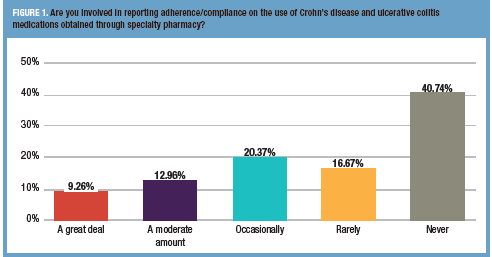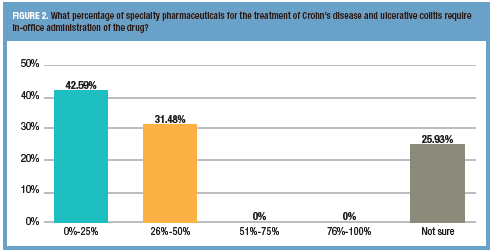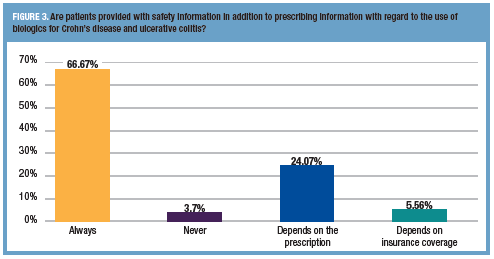Specialty Pharmacy Trends Report: Crohn`s Disease and Ulcerative Colitis
Crohn’s disease and ulcerative colitis are inflammatory bowel diseases that lead to long-lasting inflammation in the digestive tract. Both can be painful and debilitating, sometimes leading to life-threatening complications. Neither disease state has a cure, but therapies exist to reduce the signs and symptoms and bring about remission, according to the Mayo Clinic.
Both Crohn’s disease and ulcerative colitis may affect as many as 700,000 people in the United States, and genetics may play a large role—up to 20% of people with ulcerative colitis will have a close relative with the disease and 5% to 20% of people with Crohn’s disease have a first-degree relative with the disease, according to the Crohn’s and Colitis Foundation. Environment and diet also exacerbate symptoms and onset for Crohn’s disease and ulcerative colitis. Patients with ulcerative colitis and Crohn’s disease cost managed care payers an estimated $5066 and $8265, respectively, in annual disease-attributable costs, according to a study published in Gastroenterology. Total annual direct economic burden of ulcerative colitis and Crohn’s disease in the United States is estimated at $6.3 billion ($2.7 billion for ulcerative colitis and $3.6 billion for Crohn’s disease), and indirect costs of ulcerative colitis and Crohn’s disease combined have been estimated at $3.6 billion in lost productivity due to workplace absence.
_________________________________________________________________________________________________________________________________________________________
When the survey participants were asked if they are involved with reporting adherence and/or compliance on the use of Crohn’s disease and ulcerative colitis medications obtained through specialty pharmacy, 40.74% said “never,” 20.37% said “occasionally,” and 16.67% said “rarely” (Figure 1).

The survey participants were asked what percentage of specialty pharmaceuticals for the treatment of
Crohn’s disease and ulcerative colitis require in-office administration of the drug, and 42.59% said 0% to 25%, 31.48% said 26% to 50%, and 25.93% said they were unsure (Figure 2).

When asked if patients are provided with safety information in addition to prescribing information with
regard to the use of biologics for Crohn’s disease and ulcerative colitis, 66.67% of the survey participants said “always.” Another 24.07% of the survey respondents said it “depends on the prescription” (Figure 3).

Specialty pharmacy is a burgeoning field that continues to be of importance for managed care professionals. With the rates of chronic, high-cost conditions increasing, payers are eager to find ways to diffuse costs, while also providing patients with the best care possible. First Report Managed Care partnered with the National Association of Specialty Pharmacy to put together this Specialty Pharmacy Trends Report.
The information for this trends report was generated through a comprehensive survey developed via the collaborative efforts of an Advisory Panel of key thought leaders and the First Report Managed
Care editorial staff. This survey was then sent to a diverse pool of specialty pharmacy professionals. This is part 1 of a 3-part series we bring to you on the climate of specialty pharmacy as it relates to the managed markets. We hope that you find the information presented to be practical, informative, and compelling. We hope the survey results serve as a resource you can use in making future management decisions.
Survey Participant Demographics
Key thought leaders in the field of specialty pharmacy have provided the information collected in this Specialty Pharmacy Trends Report series. The following are the demographic responses, providing a snapshot of the survey participants and the organizations for which they are affiliated.
The Northeast is home to most of the survey participants (33.93%), while 28.57% of participants are in the Midwest, 10.71% in the Southeast, 10.71% in the Pacific, 10.7% in National regions, 3.57% in the Mountain region, and 1.79% said “not applicable.”
The majority of the survey respondents (60.71%) have a PharmD degree, while 39.29% have a BS in
Pharmacy, 17.86% have an MBA, 10.71% have an MS, and 5.36% have a PhD. A significant majority of survey participants (53.57%) have an RPh certification, while 17.86% have a BCPS, and 12.5% have a CSP.
When asked how long they have been in the specialty pharmacy field, 35.71% of survey participants said 0 to 5 years, while 28.57% said 11 to 20 years, and 26.79% said 6 to 10 years.
Mail-order specialty pharmacy is the primary facility of work for 23.21% of the survey participants. An additional 16.07% said their primary facility of work is an academic institution (not a university hospital), another 16.07% said a managed care organization, 14.29% said a retail specialty pharmacy,
and 10.71% said a consulting firm.
When asked what type of specialty pharmacy they are involved with, 26.79% of the survey respondents said independently owned (nonretail) and another 26.79% said pharmacy benefits manager. Another 16.07% of the survey respondents are involved with a health plan-owned specialty pharmacy and 14.29% are retail pharmacy owned.
Most of the survey respondents (39.29%) reported that they have 1% to 25% of patient interaction time on a monthly basis, while 28.57% said their role does not currently involve patient interaction.
When the survey participants were asked to select the top 5 therapeutic categories with which they are
most involved, and with the option to select up to 5 areas, the results were the following:
• Oncology (69.64%)
• Rheumatoid arthritis (67.86%)
• Hepatitis C (64.29%)
• Multiple sclerosis (50%)
• Diabetes (37.5%)
• Crohn’s disease (35.71%)
• Psoriasis/Psoriatic arthritis (35.71%)
• HIV/AIDS (25%)
• Hemophilia (23.21%)
• Immunoglobulins (12.5%)
• Cystic fibrosis (8.93%)
• Hereditary angioedema (5.36%)
• Gout (3.57%)
• Infertility (1.79%)






















